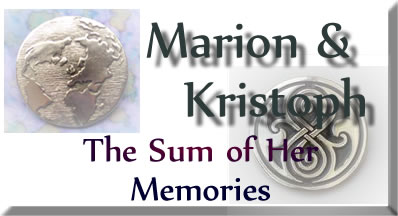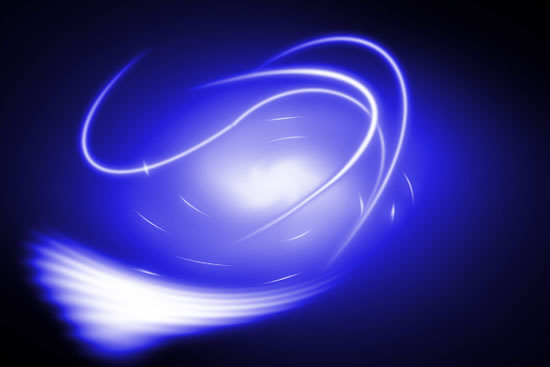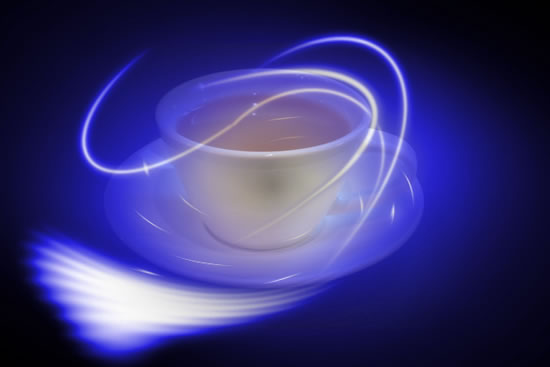

"I am Doctor Alexander," the medical man said in quick introduction. "I am a cardiovascular surgeon - part of the team that has operated on your wife. I am afraid it falls to me to tell you…."
Kristoph's hearts froze while the rest of his body trembled as he had never trembled before even in the face of imminent death. Aineytta's grip on his arm tightened as she, too, dreaded the words that were coming.
"She's dead?" Kristoph 's voice was dry as he spoke aloud the terrible phrase hammering in his brain.
"No," Doctor Alexander replied hurriedly. "No, it isn't quite as bad as that. Your wife suffered a mild heart failure which in turn caused oxygen starvation in the brain for several minutes – leading to a cerebrovascular accident - what in the old days was called a stroke.”
“A stroke… in one so young?” Kristoph queried.
“A young woman with a pre-existing heart condition,” Doctor Alexander continued. “There has been some expert surgery done in the past, but it has proved only a temporary measure. I repaired the weakened heart muscles and my colleague, Doctor Ansul, performed deep tissue laser treatment on the damaged parts of the brain, but we are not certain if...."
Kristoph had stopped trembling. The worst had not happened. Marion was alive.
She was alive in that she was breathing, her heart beating, her other organs performing their automatic functions.
Her body was alive.
But as the doctor carefully explained, there was no way of knowing, yet, how much the physical damage to the brain might have affected her. She might be partially or fully disabled by loss of motor functions. She might be blind. Worse, she might be robbed of her memories, of everything that made her the woman he loved so dearly.
She might never wake, living in a vegetative state for the rest of her natural life.
"She is alive." He focussed on that most important point. "Can I be with her?"
"Yes, of course."
The doctor had other patients to care for, but a nurse brought Kristoph and Aineytta to the quiet room where Marion had been made comfortable after the emergency operation.
Kristoph was hardly aware of his own feet as he crossed the floor between the door and the hospital bed where Marion lay in a thoroughly unnatural way, her body straight, arms at her side, her head placed neatly on the pillow. In all the nights he had slept beside her she had never slept straight. When he first knew her in that way she slept in a tight huddle, her head turned into the pillow. Later, she lay closer to him, her legs curved around his legs and her head against his shoulder.
But she had never lain so straight and so still.
He reached for her hand, grasping it tightly. He scarcely noticed the nurse bringing a chair for him, or his mother sitting by his side.
He was aware of a cool, fresh smell of sterilised air around the bed. The air closest to the patient contained extra oxygen, making a mask unnecessary. A small, unobtrusive scanner moved back and forwards over the bed remotely measuring the patient's vital signs while a single micro-needle in her arm could supply any medicine the scan indicated. At present, the only thing she needed was a saline solution to keep up her fluids. Now that the surgeons had done their work her body needed very little more.
There were no scars to show where the most advanced cardiovascular and neurological surgery had been performed. There hadn't even been any need to shave her hair. The laser scalpels were used remotely, repairing damaged organs without touching the flesh of the patient.
All of that was the reason he brought her to the station. This was the very best of human medical knowledge.
Yet even here there were limits. He tried not to be disappointed. That she was alive was the miracle he had asked for.
And if asking for more was selfish then he was guilty of that vice.
"She hardly looks alive," he whispered. "So very still. Even when she was in a coma after the plague she looked more alive than this."
He looked at the vital signs the scanner projected onto a small wall screen. They proved that Marion was breathing without assistance. Her heart was beating as it should. She was not dependent on technology to keep her alive.
If she had been, sooner or later he would have been tactfully told that there was no sense in prolonging the agony, that it would be better to turn off the machines and let her die.
He was spared that terrible dilemma at least.
But that was what Marion called a small mercy.
She was alive - in the very simplest definition of life. But how much damage had there been? How much of her was left?
How much of a wife could she be to him?
"She will have the best possible care," Kristoph decided. "Nurses around the clock to tend to her every need. She will be looked after."
"Of course she will," Aineytta said. "If this is the best we can hope for."
"She is my wife, still," Kristoph insisted. "She always will be."
"My son!" Aineytta spoke sharply. A half formed idea had risen in Kristoph 's mind. Half formed as it was, it was so powerful and such an emotive thought that she felt it in her own mind. "Do not think of such a terrible thing."
"I.... I wasn't, " he protested. "Not really. But if I were… is it so terrible? She IS still my wife. We ARE supposed to have a son. Her body is still capable of bearing ...."
He paused and shook his head.
“No, it IS a terrible idea. If any other man had said it to my face I would have been righteously angry. Marion is more to me than a womb to temporarily nurture my offspring. The idea of using her in that way is... unforgivable of me."
"I forgive you," Aineytta told him quietly. "It was a thought born out of grief and neither of us will speak of it again."
"Your wisdom, as usual, is unsurpassed, mama," Kristoph answered her. "I only wish that wisdom offered some solution to the greater grief before us. It cannot end like this. Marion is my life, my world. She is my wife until her dying day and my TRUE love for eternity, but I can’t even begin to contemplate living like this… with her lying amongst monitors, never waking, never speaking my name, never smiling. I need her to be a real wife to me… by my side. Mama, this just cannot be real. It cannot be all there is left of our marriage.”
Aineytta drew closer and reached out to touch Marion’s face as she lay there unmoving and unaware of what was happening around her. She reached into her mind and felt carefully at the fractured memories - distorted and disjointed like the fragments of a broken mirror. She saw snatches of childhood memory, random moments of her relationship with Kristoph, their wedding day, their first kiss, moment of pain and joy, but none of them connected to each other.
None of the pieces enough to make a whole.
“A man is the sum of his memories,” she said. “And a woman, too.”
“Yes,” Kristoph murmured absently, wondering why his mother had quoted such a trite phrase.
“My son, look at me,” she continued, her voice taking on a steely tone. “Look carefully, and listen to me. There IS one possibility. It may not work. If that is so, then there is no hope left. There is only this sorrowful prospect. But if it works, then Marion may be restored to you as you so desperately want her to be.”
“If there is any chance, I will take it,” Kristoph answered. “But, mama, what chance is there….”
Then he understood.
“Mama… it is a desperate chance.”
“This is a desperate time. Will you trust me, my son? Will you give me leave to try?”
“Yes, mama, I will trust you,” he answered. “I have always done so. You have my leave.”
He stood and stepped away from the bed. He turned to the door and locked it. Nobody must disturb them at this time. He stood guard against the staff of the Space Hospital Roberta Bondar who might easily misunderstand what was happening.
Aineytta, meanwhile, placed her hands firmly either side of Marion’s head and closed her eyes. She let herself drop into a light trance, barely aware of the hospital room around her. She connected mentally with Marion’s damaged memories and gently wiped them away as a mother would wipe the face of a child. These memories were too fractured to be any use. They would cause too much confusion, preventing the recovered memories from properly embedding perhaps even causing disconcerting overlaps that would create moments of distressing uncertainty.
When Marion’s memories were a blank sheet, Aineytta retrieved everything she had absorbed in the Rite of Mori and slowly returned it to the mind it came from. She felt all of Marion’s joys and sorrows as they slid back into her mind and nestled as they should, some deeply buried, some long forgotten but still there to be retrieved if needed, others newer, fresher, to be recalled with ease.
“Did it work?” That was Kristoph’s anxious question when his mother sat back and looked around, blinking at the strong overhead light as she came out of her trance.
“I think so,” Aineytta replied. “But she is still asleep. We won’t know for sure until she wakes of her own volition.”
“But now there is something to hope for.” Kristoph sat at his wife’s bedside again and held her hand in his. He watched her face carefully for any sign of change.
He did so for nearly six long hours. They were hours of ‘night’ for the Human staff of the Space Station Roberta Bondar. Lights were dimmed and most of the non-essential personnel were in their rest quarters. For Kristoph there was no sense of day or night, even artificially contrived. There were just long, silent hours of waiting.
His vigil was disturbed from time to time by nurse checking on Marion’s vital signs. As the lights came up again to signal the new day, however, the disturbance came from an orderly with a tea trolley. The trolley moved smoothly an inch above a thin magnetic line on the floor, but even so there was a comfortingly familiar sound of the teacups gently knocking against each other and a hot fragrance from the urn. Kristoph felt as if he actually could drink a cup of hospital tea.
“Two sugars please,” said a voice that seemed uncannily distant even though it was close by. He grasped Marion’s hand tighter and felt a slight pressure in return. She didn’t speak again. She was still only semi-conscious, but the sound or the smell of the tea had reached where even his love for her couldn’t.
“I think there was a television advertisement that promised miracles from a cup of tea,” he said. “But I never believed it until now. Pour a cup, not to hot. Make it very milky – with two sugars.”
The orderly gave the cup of tea to Aineytta as Kristoph gently lifted Marion by the shoulders. He took the teacup and put it to her lips. The first taste of it dribbled out of her mouth again, and he wiped her face tenderly. When he tried again, she swallowed, a voluntary movement, the first she had properly made for so many hours.
“Marion,” he whispered. “Are you awake, my love?”
“We drank tea by the harbour at Whitby,” she said in a still distant voice. “There were yachts. You recited the passage from Dracula about the Demeter from memory.”
“Yes,” Kristoph answered. “Yes, I remember it well.”
“Grandma used to make tea in a big green pot with a cracked lid put back together with Bostick glue. You could hardly see the join unless you were really looking. It was always Liptons loose tea. Grandma never used tea bags. She said you could taste the paper.”
“That I don’t remember,” Kristoph added. “Before my time.”
She only rarely talked about the early part of her life when she lived with her grandparents and had something like a normal home life.
“Some memories that were forgotten may seem vivid, again,” Aineytta said quietly. Kristoph nodded in understanding and held Marion in his arms, pressing his face against her hair and feeling the warmth of her body.
Slowly she opened her eyes and looked around at the clinically white room and the window looking out onto a slowly rotating starfield.
“Where am I?” she asked. “Kristoph, what happened? I was talking to Aineytta… and then….”
“You’ve been ill, my dear. This is a hospital. You’re going to stay here for a while, then I will take you home.”
“Home… to Gallifrey?”
“Of course,” Kristoph assured her. “Where else?”
“For a moment, I couldn’t remember where home was. But it’s all right, now. I remember everything.”
“You need to rest,” Aineytta told her. “You need a lot of rest, even when we get you home. But I think you’re going to be all right, now.”
“I would like another cup of tea,” Marion said in reply. “Before I go back to sleep. A strong one, this time – not quite so milky. With two sugars.”
“I think they might have rules about patients drinking more than one cup of tea,” Kristoph told her.
“I’ll get the tea,” Aineytta responded. “Rules or no rules.”

 |
 |
 |